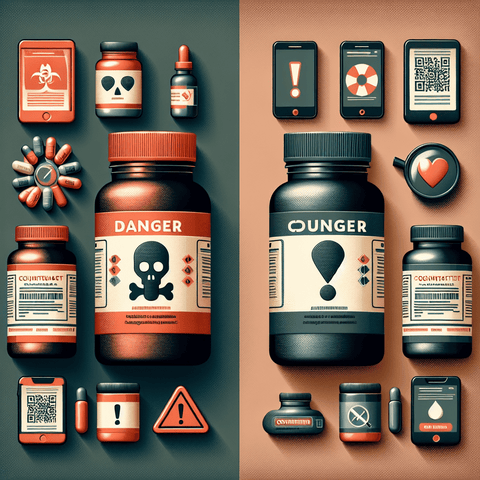Introduction
In the expansive world of wellness, nutritional supplements have carved out a substantial niche. From vitamins and minerals to botanical extracts and omega-3 capsules, consumers are increasingly integrating supplements into their health routines. As more individuals explore alternative ways to support immunity, energy, bone health, and overall well-being, the demand for high-quality nutritional supplements continues to skyrocket. According to recent industry reports, the global dietary supplement market is projected to grow from USD 152 billion in 2021 to over USD 300 billion by 2030, driven largely by consumer interest in proactive health management. However, this growth comes with challenges. Unlike pharmaceutical drugs, many supplements are not subject to stringent pre-market approval processes. This often leaves room for issues such as contamination, subpar ingredients, misleading labeling, and counterfeit products. Many health-conscious consumers are left asking the critical question: “How can I tell if my nutritional supplement is both safe and legitimate?” This comprehensive guide is designed to provide readers with the knowledge and tools they need to confidently evaluate the safety and legitimacy of the supplements they use. In the sections below, we’ll explain what supplement safety really means, explore regulatory frameworks, dive into third-party verification, and offer practical, science-based tips to protect your health. Whether you’re a seasoned wellness professional or just starting your supplement journey, this article will empower you to make informed decisions for your body and peace of mind.Understanding Nutritional Supplement Safety: What Every Consumer Needs to Know
To understand supplement safety, it’s vital to first define what qualifies as a “nutritional supplement.” According to the European Food Safety Authority (EFSA), nutritional or dietary supplements are concentrated sources of nutrients or other substances with a nutritional or physiological effect. They are intended to supplement the normal diet and are usually sold in dose forms such as capsules, tablets, powders, or liquids. Unfortunately, the fast-growing market has outpaced uniform regulation. While oversight bodies like EFSA in Europe and the Food and Drug Administration (FDA) in the United States provide guidance and legal boundaries, supplements are not "approved" before hitting the market. Manufacturers are expected to ensure product safety, but enforcement often depends on post-market surveillance. This lack of pre-approval brings several key safety concerns to light:- Contamination: Supplements may be tainted with heavy metals, bacteria, or even prescription drugs if manufacturing controls are inadequate.
- Mislabeling: The actual amounts of active ingredients might not match label claims. Some brands even omit undeclared allergens or harmful additives.
- Adulteration: Some products may be intentionally spiked with banned substances to enhance effects, especially in weight-loss or performance-enhancing supplements.
The Role of Dietary Supplement Verification: Tools and Resources You Can Trust
Dietary supplement verification is one of the most powerful tools consumers can use to distinguish high-quality products from unverified or dangerous ones. Simply put, supplement verification is the process by which an independent third-party organization evaluates a product for safety, purity, and label accuracy. This does not imply product efficacy per EFSA standards but underscores quality assurance. Reputable verification organizations include:- USP (United States Pharmacopeia): Verifies purity, potency, and manufacturing standards. A “USP Verified” seal is a strong indicator of quality.
- NSF International: Often used for sports supplements, NSF checks for contaminants and banned substances.
- Informed-Choice and Informed-Sport: Ideal for athletes, these certifications ensure supplements are free from substances banned in professional sports.
Conducting a Supplement Authenticity Check: Simple Steps to Avoid Scams
Even if a product appears well-labeled and verified, it's essential to perform your own authenticity check. The reality is that counterfeit supplements are increasingly circulated through unofficial marketplaces, offering look-alike packaging but containing no active ingredients—or worse, harmful contaminants. Begin your authenticity check by researching the brand. Direct indicators of a brand’s legitimacy include:- A professional, informative website with complete product details
- Transparent contact information and responsive customer service
- Independent lab testing disclaimers and batch traceability
- Industry recognition or awards
Identifying Safe Supplements: What High-Quality Products Have in Common
Distinguishing reliable supplements from lower-quality alternatives becomes easier once you’re familiar with the hallmarks of reputable products. Manufacturers who prioritize consumer safety typically go above the minimum legal standards to deliver transparent, science-backed formulations. Here are the key traits to look for in a high-quality supplement:- Full Ingredient Disclosure: Every ingredient should be listed with exact dosages. Avoid vague references such as “proprietary blend” or unnamed herbal or synthetic compounds.
- GMP-Certified Manufacturing: Products manufactured in GMP (Good Manufacturing Practice) facilities undergo strict monitoring to minimize contamination risks and ensure formulation consistency.
- No Harmful Additives: Reputable brands avoid using artificial dyes, synthetic preservatives, hydrogenated oils, or banned stimulants that may compromise health.
- Sourcing Transparency: Look for descriptions indicating whether ingredients are non-GMO, organic-certified, or allergen-free. For instance, supplements with marine-based omega-3s should indicate if they meet sustainable sourcing standards.
- Scientific and Expert Backing: Trustworthy brands reference EFSA-approved health statements and may include input from clinical trials when applicable.
Spotting Fake Supplements: Red Flags You Should Never Ignore
While counterfeit supplements can look alarmingly similar to genuine products, they often exhibit telling signs of deception once scrutinized. Across every supplement category—whether vitamins, minerals, or botanical blends—there are some consistent red flags that should immediately raise concerns:- Visual Inconsistencies: Fake supplements may have different font styles, misspellings, or low-resolution graphics on the label. Holograms might appear discolored or missing entirely.
- Unrealistic Claims: Be cautious of statements like “cures disease,” “works instantly,” or “replaces medication.” These violate EFSA and FDA guidelines and typically indicate a non-compliant or deceitful manufacturer.
- Broken Website Presence: Scammers rarely invest in sustainable online infrastructure. Poor website design, missing privacy policies, or generic product pages can indicate a risky source.
- Too-Good-To-Be-True Pricing: If pricing deviates drastically from competitors without a clear promotional reason, it could be a counterfeit product designed to lure unwitting buyers.
- Inconsistent Packaging Styles: Compare the product to images on the official site or retailer such as Topvitamine. Authentic supplements typically maintain consistent branding across products.
Understanding Supplement Quality Standards: What Regulations and Certifications Really Mean
Navigating quality standards in the supplement industry can feel overwhelming, but standardized certifications help demystify which products meet advanced safety and efficacy thresholds. Here are essential quality indicators to look for:- Good Manufacturing Practices (GMP): These standards ensure that supplements are consistently produced and controlled to quality standards appropriate for their intended use.
-
Certifications Worth Knowing:
- Non-GMO: Indicates the ingredients are free from genetically modified organisms.
- Organic: Certified by recognizable agencies confirming growth without synthetic pesticides or fertilizers.
- Vegan/Vegetarian: Useful for plant-based consumers avoiding gelatin or animal-derived ingredients.
- Food-Grade vs Pharmaceutical-Grade: While both types are legally available, pharmaceutical-grade supplements undergo more stringent purity tests and may offer superior bioavailability.
- Batch Testing: This process involves sampling and testing each batch produced, ensuring consistency in composition. Look for brands that transparently share batch numbers and Certificates of Analysis.
Conclusion: Empowering Yourself to Make Smarter Supplement Choices
In the ever-expanding landscape of dietary supplements, the onus of safety lies largely with the consumer. By understanding the limitations of regulation, learning how verification systems work, and becoming fluent in spotting red flags, you empower yourself to make proactive, informed decisions. We’ve discussed how supplement safety is defined, why verification by trusted organizations is critical, and how to assess product integrity firsthand. We’ve also identified the common traits of safe supplements and the warning signs of counterfeits. Ultimately, your health deserves the best—and that means demanding transparency, traceability, and quality. To continue your wellness journey with confidence, explore curated, third-party tested product collections at Topvitamine, including options featuring essential nutrients like Vitamin C, Vitamin D, and Magnesium. Supplementing smart means supplementing safe.Q&A Section
Q: How can I know if a supplement is safe?A: Look for third-party verification seals like USP or NSF, check for GMP manufacturing, confirm full ingredient disclosure, and research the brand’s reputation. Q: Are supplements regulated?
A: Yes, but often post-market. Regulatory agencies like EFSA and FDA provide guidelines, but product approval may not be required before sale. Q: Can I rely on online marketplaces for supplements?
A: Use caution. Always purchase from official brand websites or verified distributors like Topvitamine to avoid counterfeit products. Q: What certifications should I trust?
A: Reputable ones include GMP, Non-GMO Project, USDA Organic, USP Verified, NSF International, and Informed-Choice. Q: Are there apps for supplement verification?
A: Yes. Some brands offer QR codes directly linking to batch-specific test results. Certification bodies also offer searchable databases.



